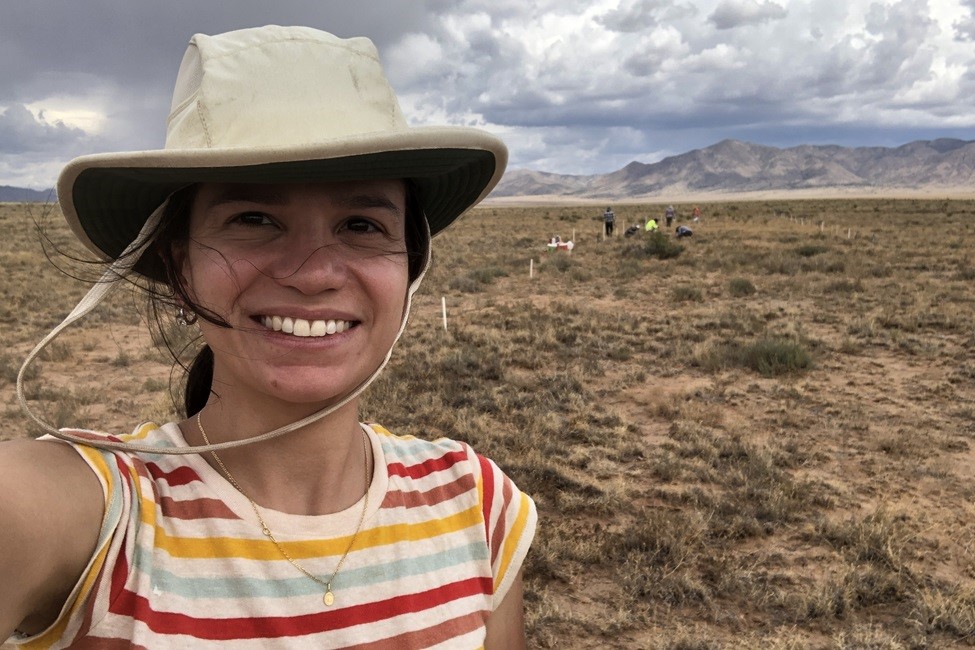FAU Lands $1.3M NSF Grant to Boost Dryland Soil Quality

Vanessa Moreira C. Fernandes, Ph.D., principal investigator and an assistant professor, FAU Department of Biological Sciences.
Drylands, found across every continent, cover about 45% of the Earth's land surface and support 38% of the human population. In these regions, precipitation is low and evaporation rates are typically high, leading to an arid or semi-arid climate. Due to scarce water resources and sparse vegetation, drylands present formidable challenges for agriculture and human habitation. As the climate continues to warm, drylands are rapidly expanding.
A particularly urgent problem in drylands is climate-driven soil degradation, which affects about 33% of the planet’s land surface.
Drylands host distinct soil microbial communities, featuring biocrusts comprising cyanobacteria (blue-green algae) and fungi. These vital communities, resembling fragile crusts formed by mosses, lichens, cyanobacteria, and fungi, reside on the soil surface. They play essential roles in enhancing soil stability, minimizing erosion, nitrogen fixation, and enriching soil organic matter, thereby maintaining soil health and fertility in these ecosystems.
Currently, little is known about the physiological resistance of these microbes to climate stressors or the specific functions of individual species.
To enhance understanding of climate resistance of individual microbes and to improve microbial remediations to reduce soil degradation under climate change, Florida Atlantic University has received a $1.3 million grant from the National Science Foundation (NSF).
The project, spearheaded by Vanessa Moreira Camara Fernandes, Ph.D., principal investigator and an assistant professor of biological sciences, within FAU’s Charles E. Schmidt College of Science, will deepen knowledge of how microbes react to climate conditions, how these reactions impact their communities and the functions of ecosystems, and how ecosystem dynamics, in turn, affect microbial responses to climate.
“Drylands generate feedback to climate change because they account for about one-third of global soil organic carbon and make the largest contributions to interannual carbon fluxes of any terrestrial biome,” said Fernandes.
Research activities will integrate knowledge across levels of biological organization to improve the accuracy of predictions on soil health under climate change and discover microbial solutions that can maximize the resistance of soil health to climate change. The project will build the first comprehensive dataset on dryland microbe physiological resistance to heat and drought. Through trait-based analyses, researchers will investigate overarching principles governing microbial resistance to climatic stressors.
“The design of microbial assemblages for dryland restoration will test our novel hypothesis that integrating bacterial and fungal communities will confer greater resistance against heat and drought and restore function to degraded soils,” said Fernandes. “We are excited about the potential of this research to generate unique predictions and solutions aimed at enhancing the resilience of drylands to soil degradation amidst climate change.”
As part of the project, Fernandes and her collaborators will conduct laboratory experiments to characterize the heat and dehydration resistance traits of 30 species and will investigate the molecular mechanisms underlying resistance in eight of these species.
“We hope to unravel how heat and drought alter microbial interactions within biocrusts, and how these microbial communities influence their own resistance to environmental stressors,” said Fernandes. “Using greenhouse mesocosms, we will manipulate heat and drought conditions to optimize microbial assemblages that can withstand climate stress.”
The project also aims to develop rules for assembling cross-domain microbial communities (bacteria and fungi) that may enhance overall resistance as well as to design climate-ready microbial communities to be applied in field experiments and reverse soil degradation.
“Our field experiments will determine if what we've learned in the lab and simulated environments can be applied to real-world conditions, creating microbial communities that can restore soil health by withstanding heat and drought," said Fernandes.
Ecologists and microbiologists will work collaboratively on activities that leverage prior NSF-funded infrastructure and biological collections, including collaboration with Sevilleta LTER. The project coalesces a new interdisciplinary team for dryland soil health, including Jennifer A. Rudgers, Ph.D., at the University of New Mexico; and Nicole Pietrasiak, Ph.D., at the University of Nevada, Las Vegas. The team will mentor three graduate and 24 undergraduate students.
The project also will support three “Research Experience for Undergraduates” students; a new gateway majors course; a new community science photography project to raise public awareness of the ecological services of biocrusts; annual biocrust workshops for park personnel, park volunteers, land managers, retirees, school teachers, students and interpreters together with Joshua Tree National Park Association; a schoolyard Data Jam (in Spanish) with students from Las Vegas, Miami, Albuquerque and Puerto Rico; and Biocrust Data Nuggets, co-designed by scientists and teachers to bring contemporary research and authentic data into underserved K-12 classrooms.
“This significant grant from the National Science Foundation awarded to Dr. Fernandes will help fill substantial use-inspired knowledge gaps on the effective application of microbes as ‘game-changers’ to mitigate the impacts of a rapidly changing climate,” said Valery Forbes, Ph.D., dean, FAU Charles E. Schmidt College of Science. “Importantly, this project will train and inspire our next generation of scientists and conservationists, empowering them to address our most complex global issues with innovative solutions.”
-FAU-
Tags: faculty and staff | science | research